SWEDISH
SOUTH ASIAN STUDIES NETWORK
Newsletter 105:
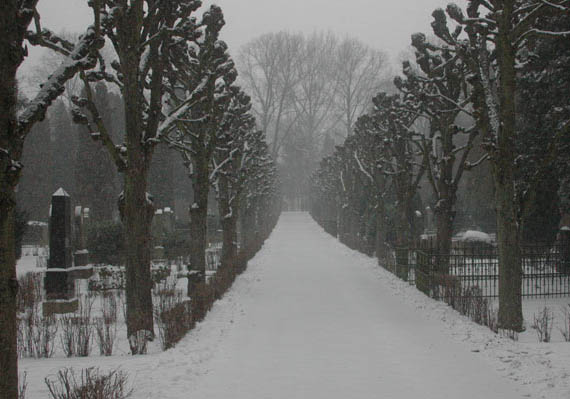 29 January 2010
29 January 2010
| Educational News |
| Lectures and seminars |
| Business and Politics |
| South Asia related Culture |
| New and updated information |
• Turbulent year behind
but SASNET continues
with Lund University support
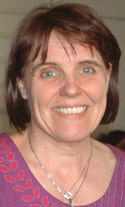 |
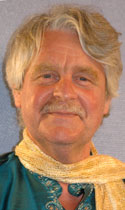 |
The past year (2009) has been a turbulent time for SASNET, with many wonderful
events, but also some problems. The network has grown tremendously. Our web site has developed in a large scale, and our newsletters
reach 2,000 recipients.
The conference for young Nordic scholars working on South Asia related
projects held at Falsterbo in August became a success, and we (Anna Lindberg and Lars Eklund, with assistance from Stig Toft Madsen during the spring, and Nihat Ulusoiy during the fall), have also organised a large number of other conferences and seminars on important issues.
SASNET’s networking activities within Sweden consisted of visits to the universities of Jönköping, Växjö, Skövde, Västerås, and the Royal Institute of Technology (KTH) in Stockholm. We have also been strongly involved in networking with
the South Asian diplomatic representatives in Scandinavia.
Our networking/planning grants were distributed to five new research
projects, and financial support was also given to three guest lecture programmes and two South Asia-related interdisciplinary research
workshops.
However, in addition to these activities, we have had to spend a great deal of time seeking
new funding to replace the subsidy that Sida/SAREC has generously provided for
the ten-year period that ended December 31, 2009. But all efforts to resolve this problem have failed.
 However, Lund University has promised to continue their underwriting,
which till now has comprised about one-third of our budget, and we are in the process of negotiating with the University for additional funds. Their support will make it possible for us to keep our doors through 2010. Furthermore, Lund University has expressed its firm commitment to maintain SASNET’s extensive web site, its databases and its newsletters, whatever other changes in directions that may come.
However, Lund University has promised to continue their underwriting,
which till now has comprised about one-third of our budget, and we are in the process of negotiating with the University for additional funds. Their support will make it possible for us to keep our doors through 2010. Furthermore, Lund University has expressed its firm commitment to maintain SASNET’s extensive web site, its databases and its newsletters, whatever other changes in directions that may come.
Nevertheless, due to the precarious current situation, with SASNET no longer
receiving Swedish government funding and other Swedish universities unwilling
to co-fund SASNET with membership fees (we had proposed that each university
contribute SEK 50,000 a year – equivalent to EUR 5,000), the situation for SASNET as such is very unclear.
Read a full report on the 2009 activities, and our efforts to secure continued funding in our Christmas letter 2009.
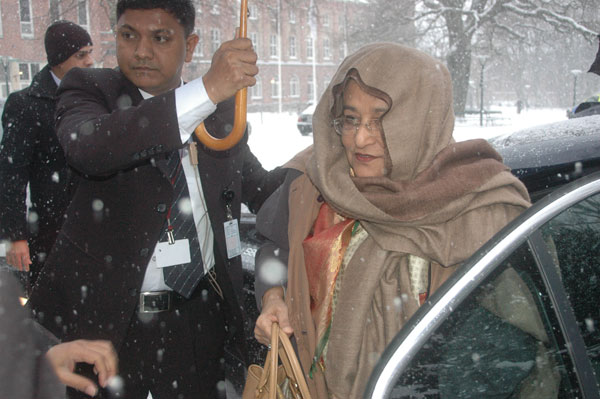 • SASNET organised
• SASNET organised
successful visit by
Sheikh Hasina to Lund
On Saturday 19 December 2009, Her Excellency Sheikh Hasina,
Prime Minister of Bangladesh, visited
Lund University to hold a public lecture on ”Climate Change in
Bangladesh – Facing the Challenges”. Sheikh Hasina was invited to visit Lund by SASNET and the
Association of Foreign Affairs at Lund University (UPF), and was hosted by Lund University Vice Chancellor Per Eriksson.
A large delegation of ministers and around 20 members of the Bangladeshi parliament (who have attended the COP 15 climate conference in Copenhagen) accompanied the Prime Minister from Copenhagen during this high-security visit to Lund. The interest from Lund University students and researchers, as well as from the local Bangladeshi community was overwhelming. The lecture hall was crowded, and the event was documented by a couple of Bangladeshi TV company crews. More information.
See Lars Eklund’s photos from Sheikh Hasina’s visit to Lund.
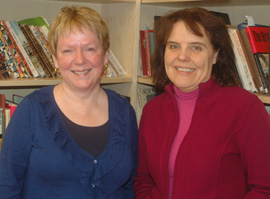 |
| Martha Garrett to the left, with SASNET’s director Anna Lindberg. |
• SASNET invited to join INFORM project
Dr. Martha Garrett from International Maternal and Child Health (IMCH), Department of Women’s
and Children’s Health, Uppsala University, visited SASNET’s root node office in Lund on Thursday 28 January 2010. INFORM (International Network for Online Resources & Materials) is a Swedish-based networking programme that provides onsite information training in low-income countries (more information). Since INFORM’s next major activity will be a regional programme in Asia, Dr. Garrett extended an invitation to SASNET to become a partner in this programme. Health professionals working on reproductive health and maternal-and-child health in 10-12 Asian countries, mostly in south Asia, will receive intensive training about where to find free, high-quality materials for teaching, clinical practice and policy formulation. After the training, they will carry out their own information projects and also exchange information through an online forum.
•
Current SASNET board stays on till September 30, 2010
In late November 2009, the Vice Chancellor, Lund University, decided to prolong the period for the current SASNET board, that was supposed to expire on 31 December 2009, to September 30, 2010. This decision was endorsed by SASNET’s board at an extra board meeting that was held in Lund on Wednesday 9 December 2009. At the same time the board decided to extend the period for SASNET’s South Asian Reference Group (more information) to the same date, i e 30 September 2010. Information about SASNET’s board and organisation.
• Anna Lindberg lectured on Changed Gender Relations among South Indian Muslims
On Tuesday 19 January 2010, 12.15–13.15, SASNET’s director Anna Lindberg presented her ongoing research in an open lecture with the title ”Islamisation, Modernisation, or Globalisation? Changed Gender Relations among South Indian Muslims”. The lecture was organised by the Centre for East and South East Asian Studies (ACE), Lund University. Venue: ACE, Conference Room (#2065), Scheelevägen 15D, Lund (2nd floor).
• More information about SASNET and its
activities
See SASNET’s page, http://www.sasnet.lu.se/sasnet.html
• Swedish Research Links grants to South Asia related projects
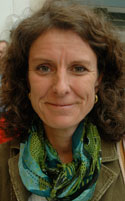 On 15 December 2009, Swedish
Research Links grants for the period 2010-12 were decided upon
for a large number of Asia related research projects. Sida and the Swedish Research Council
initiated the Swedish Research Links programmes in 2002, and
within this framework the Asian–Swedish Research partnership
programme specifically aims to stimulate contacts between
Swedish researchers and researchers in Asia. Maximum grants, SEK 750 000 as International Collaborative Research Grants, are given to Dr. Anna Godhe (photo), Department of Marine Ecology, University of Gothenburg for the project ”Mitigating effects of harmful algal blooms in the Arabian Sea”; and Prof. Anna Norrby-Teglund, Center for Infectious Medicine (CIM), Department of Medicine, Karolinska Institutet, for the project project ”Pathogenic mechanisms of meticillin-resistant Staphylococcus aureus”.
Prof. Hanumantha Rao, Division of Mineral Processing, Department of Chemical Engineering and Geosciences, Luleå University of Technology, also receives SEK 750 000 for the project ”Particle size effect in flotation and agglomeration as a novel source of enhancing surface selectivity and pellet quality”; and the same applies to Prof. Maria Lerm, Department of Medical and Health Sciences, Linköping University, for the project ”Latency of Mycobacterium tuberculosis: evaluating drugs and drug targets using innovative models”.
On 15 December 2009, Swedish
Research Links grants for the period 2010-12 were decided upon
for a large number of Asia related research projects. Sida and the Swedish Research Council
initiated the Swedish Research Links programmes in 2002, and
within this framework the Asian–Swedish Research partnership
programme specifically aims to stimulate contacts between
Swedish researchers and researchers in Asia. Maximum grants, SEK 750 000 as International Collaborative Research Grants, are given to Dr. Anna Godhe (photo), Department of Marine Ecology, University of Gothenburg for the project ”Mitigating effects of harmful algal blooms in the Arabian Sea”; and Prof. Anna Norrby-Teglund, Center for Infectious Medicine (CIM), Department of Medicine, Karolinska Institutet, for the project project ”Pathogenic mechanisms of meticillin-resistant Staphylococcus aureus”.
Prof. Hanumantha Rao, Division of Mineral Processing, Department of Chemical Engineering and Geosciences, Luleå University of Technology, also receives SEK 750 000 for the project ”Particle size effect in flotation and agglomeration as a novel source of enhancing surface selectivity and pellet quality”; and the same applies to Prof. Maria Lerm, Department of Medical and Health Sciences, Linköping University, for the project ”Latency of Mycobacterium tuberculosis: evaluating drugs and drug targets using innovative models”.
Another 11 South Asia related projects receive International Collaborative Research Grants varying from SEK 600 000 to SEK 730 000, and four projects receive a one-year International Planning Grant worth SEK 75 000. Go
for SASNET’s list of South Asia related projects given
Swedish Research Links grants 2009.
• Doctoral dissertation on Bhaktivedanta Sarasvati
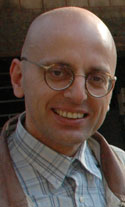 Ferdinando Sardella, Department of Literature, History of Ideas, and Religion, University of Gothenburg, will defend his doctoral dissertation entitled ”Bhaktisiddhanta Sarasvati. The Context and Significance of a Modern Hindu Personalist” on Saturday 6 February 2010, at 10.15. The faculty opponent will be Julius Lipner, Professor in Hinduism och Comparative Religion at the Divinity Faculty, University of Cambridge, UK. The thesis is based on field work carried out in West Bengal, India, where he spent a total of one year during the period 2004–08. This study explores the life and work of Bhaktisiddhanta Sarasvati (1874-1937), a Vaishnava guru of the school of Chaitanya (1486-1534), who, at a time that Hindu non-dualism was most prominent, manag
ed to establish a pan-Indian movement for the modern revival of traditional personalist bhakti that today encompasses both Indian and non-Indian populations throughout the world. Venue: Lilla hörsalen, Humanisten, Renströmsgatan 6, Gothenburg. More information.
Ferdinando Sardella, Department of Literature, History of Ideas, and Religion, University of Gothenburg, will defend his doctoral dissertation entitled ”Bhaktisiddhanta Sarasvati. The Context and Significance of a Modern Hindu Personalist” on Saturday 6 February 2010, at 10.15. The faculty opponent will be Julius Lipner, Professor in Hinduism och Comparative Religion at the Divinity Faculty, University of Cambridge, UK. The thesis is based on field work carried out in West Bengal, India, where he spent a total of one year during the period 2004–08. This study explores the life and work of Bhaktisiddhanta Sarasvati (1874-1937), a Vaishnava guru of the school of Chaitanya (1486-1534), who, at a time that Hindu non-dualism was most prominent, manag
ed to establish a pan-Indian movement for the modern revival of traditional personalist bhakti that today encompasses both Indian and non-Indian populations throughout the world. Venue: Lilla hörsalen, Humanisten, Renströmsgatan 6, Gothenburg. More information.
• High time to register for NASA conference in Helsinki
 If you plan to attend the 2010 Nordic Association for South Asian Studies conference and PhD workshop, that will be held 26–29 May 2010 in
Helsinki, Finland, remember to send your paper abstracts by 31 January 2010. The theme for the conference will be ”Globalizing South Asia”, and it is
organised by the University of Helsinki. The conference aims to bring
scholars from different fields within humanities and social sciences
(history, anthropology, sociology, economics, geography, environmental
science, development studies and political science) together to analyze
cultural, economic, political and environmental connections in South
Asia. Both Nordic and non-Nordic scholars are invited to participate in
the conference that is meant to stimulate networking and exchange, and
to create a forum for discussions for scholars and doctoral students
within and outside the Nordic countries. The abstracts should be
e-mailed to both the convenors, Dr. Sirpa Tenhunen, and Dr. Klaus Karttunen.
If you plan to attend the 2010 Nordic Association for South Asian Studies conference and PhD workshop, that will be held 26–29 May 2010 in
Helsinki, Finland, remember to send your paper abstracts by 31 January 2010. The theme for the conference will be ”Globalizing South Asia”, and it is
organised by the University of Helsinki. The conference aims to bring
scholars from different fields within humanities and social sciences
(history, anthropology, sociology, economics, geography, environmental
science, development studies and political science) together to analyze
cultural, economic, political and environmental connections in South
Asia. Both Nordic and non-Nordic scholars are invited to participate in
the conference that is meant to stimulate networking and exchange, and
to create a forum for discussions for scholars and doctoral students
within and outside the Nordic countries. The abstracts should be
e-mailed to both the convenors, Dr. Sirpa Tenhunen, and Dr. Klaus Karttunen.
The keynote speakers will be Professor Steve Derne, State University of New York at Geneseo, USA; Prof. Bishnupriya Ghosh, University of California, Santa Barbara, USA; Prof. William Mazzarella, University of Chicago, USA; and Prof. Himanshu Rai, Centre for Historical Studies, Jawaharlal Nehru University (JNU), India. A peer-reviewed volume of selected papers will be published after the
conference.
Full information about the 2010 NASA conference.
• Time to register for the 2010 ECMSAS conference in Bonn
 Scholars and students from any field of research related
to the South Asian region are invited to participate in
the 21st European Conference on Modern South Asian Studies
Scholars and students from any field of research related
to the South Asian region are invited to participate in
the 21st European Conference on Modern South Asian Studies
(ECMSAS) in Bonn, Germany, 26–29 July 2010. The ECMSAS is the largest gathering of South Asia oriented researchers in Europe, covering all fields from the humanities and social sciences to technology, natural sciences and medicine. For many years, it has been an important platform
and indicator of contemporary trends in South Asian
studies worldwide. The 21st ECMSAS will host 44 panels,
covering a broad range of research subjects. Hosting agency is the Institute for Asian and Oriental Studies,
University of Bonn. The university’s chair of indology,
the first of its kind in Germany, was established already in the
year of the foundation of the university, in 1818.
The ECMSAS conferences are held biannually under the aegis of the European Association of South Asian Studies (EASAS), a professional, non-profit organisation of scholars engaged in research and teaching concerning South Asia with regard to all periods and fields of study.
SASNET organised the 18th ECMSAS conference in Lund in 2004 (more information). The 2006 conference was held in Leiden, the Netherlands (read SASNET’s report); and the 2008 conference was organised by the University of Manchester, UK.
Researchers from Europe and all over the world are invited to contribute with papers
for presentation at the 2010 ECMSAS conference in Bonn. Suggestions should be forwarded directly to the convener of the specific panel your paper might fit into. Conveners are free to decide whether a paper will be accepted or not. Full information on the Bonn conference web site.
Two panels are convened by Swedish scholars:
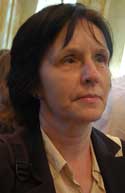 – Panel No. 23, the Bengal Studies Panel, is convened by PhD candidate Kerstin Andersson (photo), School of Global Studies/Anthropology, University of Gothenburg (along with Manjita Mukharji from SOAS in London). The ECMSAS Bengal Studies panel has through the years developed into an important forum for scholars working on Bengal and Bengali studies. As the number of scholars is quite limited and the group is scattered all over the world, the panel provides a meeting point and an opportunity to share research for all with an interest in the culture and society of West Bengal and Bangladesh – and the Bengali Diaspora worldwide. The interdisciplinary approach of the panel welcomes papers on diverse topics such as past and present, literature and media, religion and secularity, women and men, tradition and culture, and on theory and methods in a specifically Bengali context. More information about Panel 23.
– Panel No. 23, the Bengal Studies Panel, is convened by PhD candidate Kerstin Andersson (photo), School of Global Studies/Anthropology, University of Gothenburg (along with Manjita Mukharji from SOAS in London). The ECMSAS Bengal Studies panel has through the years developed into an important forum for scholars working on Bengal and Bengali studies. As the number of scholars is quite limited and the group is scattered all over the world, the panel provides a meeting point and an opportunity to share research for all with an interest in the culture and society of West Bengal and Bangladesh – and the Bengali Diaspora worldwide. The interdisciplinary approach of the panel welcomes papers on diverse topics such as past and present, literature and media, religion and secularity, women and men, tradition and culture, and on theory and methods in a specifically Bengali context. More information about Panel 23.
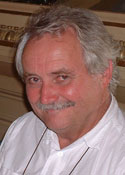 – Panel No. 37, on Confrontations in Sri Lankan politics. Origins and present developments, is convened by Prof. Peter Schalk (photo), History of Religions, Faculty of Theology, University of Uppsala. The panel focuses on the radical changes observed in Sri Lanka during the last year, with more than hundred thousand refugees being caught in the armed struggle of the Sri Lankan armed forces and the LTTE. The LTTE suffered a military defeat but at the same time a resilient Tamil Diaspora in Canada, Australia and the EU demonstrated the LTTE's defiance. Scholars are invited to elaborate on and explain the radical changes and its consequences for the economic development and for the possibilities of reconciliation for peace. More information about Panel 37.
– Panel No. 37, on Confrontations in Sri Lankan politics. Origins and present developments, is convened by Prof. Peter Schalk (photo), History of Religions, Faculty of Theology, University of Uppsala. The panel focuses on the radical changes observed in Sri Lanka during the last year, with more than hundred thousand refugees being caught in the armed struggle of the Sri Lankan armed forces and the LTTE. The LTTE suffered a military defeat but at the same time a resilient Tamil Diaspora in Canada, Australia and the EU demonstrated the LTTE's defiance. Scholars are invited to elaborate on and explain the radical changes and its consequences for the economic development and for the possibilities of reconciliation for peace. More information about Panel 37.
Among other interesting ECMSAS 2010 panels, can be mentioned Panel 2: The History of Alcohol and Drugs in Modern South Asia (18th-20th Century), convened by Dr Harald Fischer-Tiné, and Jana Tschurenev; Panel 6: Uttar Pradesh: Development Failure and Identity Politics, convened by Jens Lerche, Roger Jeffery, and Craig Jeffrey; Panel 34: Communism Compared: Andhra Pradesh and Kerala in the 1950s, convened by V Rajagopal, and Margret Frenz; and Panel 36: Taliban, Durand Line and Refugees: The Afghan-Pakistan Border Region under Stress, convened by Conrad Schetter. More information about the ECMSAS 2010 panels.
• Bo Lindblad’s research on folate deficiency gets recognition
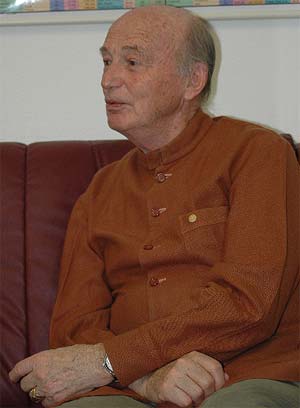 Swedish research
on how folate/B12 deficiency among South Asian women may lead to vascular endothelial dysfunction has received wide international recognition with rising citation rates. In 2005 a research paper based on a study in Lahore supported by a SASNET planning grant was being published in the peer reviewed magazine Acta Obstetricia et Gynecologica Scandinavica (2005:84:1055-1061). It was based on research by Bo Lindblad (photo),
Professor Emeritus of International Child Health, Division of Global Health (IHCAR), Karolinska Institutet (KI), Stockholm; Dr Shakila Zaman, Dept. of Social and Preventive Peaditrics, King Edward Medical College, Lahore, Pakistan; and a number of other KI researchers (Helena Martin, Anna Mia Ekström,
Arne Holmgren and Mikael Norman).
The paper, entitled ”Folate, vitamin B12, and homocysteine
levels in South Asian women with growth retarded fetuses” shows how in intraurerine growth, retardation folate levels
were half that in cord blood and mothers as compared to local controls.
Swedish research
on how folate/B12 deficiency among South Asian women may lead to vascular endothelial dysfunction has received wide international recognition with rising citation rates. In 2005 a research paper based on a study in Lahore supported by a SASNET planning grant was being published in the peer reviewed magazine Acta Obstetricia et Gynecologica Scandinavica (2005:84:1055-1061). It was based on research by Bo Lindblad (photo),
Professor Emeritus of International Child Health, Division of Global Health (IHCAR), Karolinska Institutet (KI), Stockholm; Dr Shakila Zaman, Dept. of Social and Preventive Peaditrics, King Edward Medical College, Lahore, Pakistan; and a number of other KI researchers (Helena Martin, Anna Mia Ekström,
Arne Holmgren and Mikael Norman).
The paper, entitled ”Folate, vitamin B12, and homocysteine
levels in South Asian women with growth retarded fetuses” shows how in intraurerine growth, retardation folate levels
were half that in cord blood and mothers as compared to local controls.
Two years later, a second paper on the same issue, again written by Bo Lindblad, Helena Martin, and Mikael
Norman, was published in Pediatrics (2007:119:
1152-58). In the paper, entitled ”Endothelial function in Newborn Infants”, the researchers for the first time convincingly show the correlation of folate levels
to vascular endothelial dysfunction (still there at 9 years of age being a known condition leading to arteriosclerosis, hypertension and
stroke).
Recently, Prof. Lindblad’s hypothesis of folate/B12 deficiency in the pathogenesis of
preeclampsia has also been supported by four new papers focusing on folate supplementation to
pregnant women in Canada and the USA. Obviously being at the research
front, Prof. Lidblad and his colleagues are now discussing how to proceed with research for supplementation in India and
Pakistan. There is a need for both basic
science, biochemical and genetics, as well as controlled
supplementation studies in developing regions with known folate and
B12 deficiency.
• Obituary for Professor William Smith 
William
Smith, Professor of South Asian languages
and cultures at the Department of Linguistics
and Philology, Uppsala University passed away on 19th December 2009. Prof. Smith was the one of the most capable and respected indologists in Scandinavia, and a valued member of the SASNET network. His work is appreciated worldwide. His untimely death is a loss for indological and South Asian studies.
The funeral was held on Tuesday 26 January 2010 in Lötsjökapellet, Hallonbergen, Stockholm.
Dr. Heinz Werner Wessler, currently a guest teacher at the Dept. of Linguistics and Philology, Uppsala University, has written an obituary for SASNET. Read his obituary text.
• Swedish Dharavi book project may affect the future for the slums
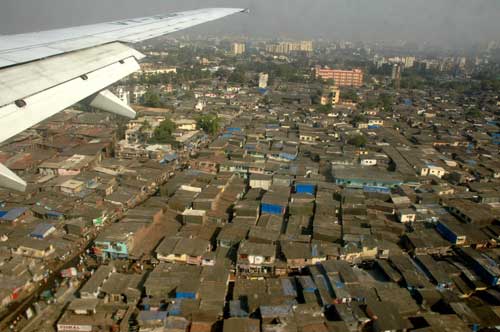 A SASNET supported projects seems to have far-reaching effects against the eviction of the Dharavi slums in Mumbai, India. The book Dharavi: Documenting Informalities, launched in 2008, was a
project made by ten artists, architects and academics at the Dept. of Art & Architecture, Royal University College of Fine Arts (KKH) in Stockholm. The book contained 300 pages of drawings,
photographs and articles on the informal settlement Dharavi in the
centre of Mumbai, India. Texts by Saskia Sassen and Arjun Appadurai accompany
the articles. More information about the book project.
A SASNET supported projects seems to have far-reaching effects against the eviction of the Dharavi slums in Mumbai, India. The book Dharavi: Documenting Informalities, launched in 2008, was a
project made by ten artists, architects and academics at the Dept. of Art & Architecture, Royal University College of Fine Arts (KKH) in Stockholm. The book contained 300 pages of drawings,
photographs and articles on the informal settlement Dharavi in the
centre of Mumbai, India. Texts by Saskia Sassen and Arjun Appadurai accompany
the articles. More information about the book project.
The KKH group behind the book, led by Dr. Maria Lantz, Senior Lecturer, was rewarded a SASNET
planning grant in August 2008. The idea was to travel back to Mumbai
and Dharavi in order to organise a workshop with an aim to evaluate the book and investigate how the
material collected for it, could be used on location.
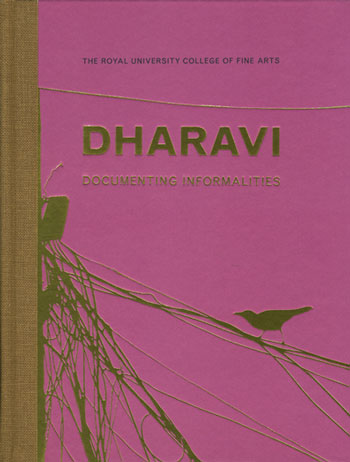 The project group could never have guessed how things should move on. In November 2009 an Indian
edition of the book was released and an exhibition in Prince of Wales
Museum opened. Here, artist-talks and debates were conducted by the
artists and the slum-dwellers organisations.
The project group could never have guessed how things should move on. In November 2009 an Indian
edition of the book was released and an exhibition in Prince of Wales
Museum opened. Here, artist-talks and debates were conducted by the
artists and the slum-dwellers organisations.
Gautam Chatterjee, Vice President and Chief Executive Officer of
the Maharashtra Housing & Area Development Authority (MHADA) participated in the event along with the Swedish Ambassador to India, Mr Lars-Olof Lindgren, and Mr. Dan Ericsson, State Secretary to the Swedish Minister for Local Government and Financial Markets.
Most interesting was the speech then held by Mr. Chatterjee at the book
release function. He now claimed that the book Dharavi: Documenting Informalities helped him to
make a decision to stop the ongoing plans to evict the inhabitants of
Dharavi and sell out the land. A decision that was taken by the previous CEO
of MHADA. This fact was loudly applauded by the Dharavi representatives who
have long struggled to improve their livelihood on locations, but has refused to accept
evictions from this uniqe place – a vernacular city, created and planned
by people themselves.
• Robert McNamara fellowship for Manish Thapa in Uppsala
 Mr. Manish Thapa (photo), Regional Coordinator for the South Asian Regional Cooperation Academic Network (SARCAN) based in Kathmandu, Nepal, has received the Robert McNamara Fellowship from the World Bank which makes it possible for him to work on his doctoral dissertaion project entitled ”From Bullet to Ballot:
The Politics of Peacemaking in Nepal” at the Dept. of Peace and Conflict Research, Uppsala University, during the period January – June 2010. His supervisor is Professor Thomas Ohlson.
Mr Thapa has previously been a Visiting Fellow at the Kroc Institute for International Peace Studies, University of Notre Dame, Indiana, USA.
Mr. Manish Thapa (photo), Regional Coordinator for the South Asian Regional Cooperation Academic Network (SARCAN) based in Kathmandu, Nepal, has received the Robert McNamara Fellowship from the World Bank which makes it possible for him to work on his doctoral dissertaion project entitled ”From Bullet to Ballot:
The Politics of Peacemaking in Nepal” at the Dept. of Peace and Conflict Research, Uppsala University, during the period January – June 2010. His supervisor is Professor Thomas Ohlson.
Mr Thapa has previously been a Visiting Fellow at the Kroc Institute for International Peace Studies, University of Notre Dame, Indiana, USA.
• Erroneous warning by the Intergovernmental Panel on Climate Change (IPCC)
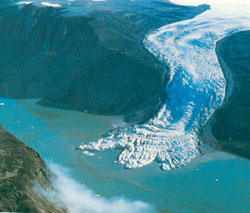 A warning that climate change will melt most of the Himalayan glaciers by 2035 is likely to be retracted after a series of scientific blunders by the United Nations body that issued it. In 2007, the Intergovernmental Panel on Climate Change (IPCC) issued a benchmark report that was claimed to incorporate the latest and most detailed research into the impact of global warming. A central claim was the world's glaciers were melting so fast that those in the Himalayas could vanish by 2035. Read the IPCC report on the issue.
After facing severe doubts of the validity of these claims, the scientists behind the warning in mid-January 2010 admitted that the report was based on a speculative news story in the New Scientist, a popular science journal, published eight years before the IPCC's 2007 report. It has also emerged that the New Scientist report was itself based on a short telephone interview with Syed Hasnain, a little-known Indian scientist then based at Jawaharlal Nehru University (JNU) in Delhi.
A warning that climate change will melt most of the Himalayan glaciers by 2035 is likely to be retracted after a series of scientific blunders by the United Nations body that issued it. In 2007, the Intergovernmental Panel on Climate Change (IPCC) issued a benchmark report that was claimed to incorporate the latest and most detailed research into the impact of global warming. A central claim was the world's glaciers were melting so fast that those in the Himalayas could vanish by 2035. Read the IPCC report on the issue.
After facing severe doubts of the validity of these claims, the scientists behind the warning in mid-January 2010 admitted that the report was based on a speculative news story in the New Scientist, a popular science journal, published eight years before the IPCC's 2007 report. It has also emerged that the New Scientist report was itself based on a short telephone interview with Syed Hasnain, a little-known Indian scientist then based at Jawaharlal Nehru University (JNU) in Delhi.
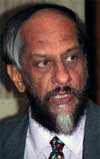 After the news about the erroneous report was exposed, the IPPC chairman Dr. R K Pachauri (photo) came under strong attack in India, and demands have been raised for his resignation. Dr. Pachauri is also Director-General for the prestigeous Energy and Resources Institute (TERI) in New Delhi, an institute that in the recent past have procured large international funding for research based on the false claims in the 1997 IPCC Fourth Assessment Report. More information.
After the news about the erroneous report was exposed, the IPPC chairman Dr. R K Pachauri (photo) came under strong attack in India, and demands have been raised for his resignation. Dr. Pachauri is also Director-General for the prestigeous Energy and Resources Institute (TERI) in New Delhi, an institute that in the recent past have procured large international funding for research based on the false claims in the 1997 IPCC Fourth Assessment Report. More information.
• INFORM network expand its Asian activities even further
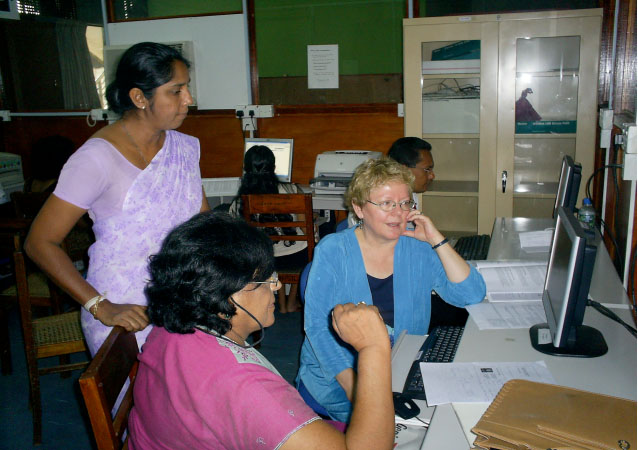 INFORM (International Network for Online Resources & Materials) is a Swedish-based networking programme that provides onsite information training in low-income countries. The programme is led by Dr Martha Garrett, researcher at International Maternal and Child Health (ICMH), Dept. of Women’s
and Children’s Health, Uppsala University; and Anders Wändahl, a librarian at Karolinska Institutet. INFORM has been increasingly active in Asia during the past two years, partly with SASNET support, and now plans to expand its Asian activities even further.
INFORM (International Network for Online Resources & Materials) is a Swedish-based networking programme that provides onsite information training in low-income countries. The programme is led by Dr Martha Garrett, researcher at International Maternal and Child Health (ICMH), Dept. of Women’s
and Children’s Health, Uppsala University; and Anders Wändahl, a librarian at Karolinska Institutet. INFORM has been increasingly active in Asia during the past two years, partly with SASNET support, and now plans to expand its Asian activities even further.
Academic professionals who go through the INFORM training become familiar with dozens of access routes and ‘gateways’ into free, online information resources, as well as hundreds of specific resources to support research, teaching and practice within their own disciplines. The programme was established at the request of foreign researchers who had received their PhDs at Swedish universities and returned to their home countries, where they were frustrated by their apparent lack of access to information. Since it was established in 2004, INFORM has provided national workshops in 20 countries, as well as several regional workshops. Most of the training has been about information resources for medicine and health, although some has dealt with information resources relevant to other subjects, such as physics and mathematics.
INFORM’s first training in South Asia was commissioned by Professor Kumudu Wijewardena at the University of Sri Jayewardenepura in Sri Lanka. Photo from an INFORM workshop in Sri Lanka held in 2006 above.
INFORM trainers have also been involved in information training workshops in other SASNET countries, including India (for the Reproductive and Child Health and Rights Network in Jaipur, Rajasthan), Afghanistan (for the Afghanistan Midwives Association), and Pakistan (for the Higher Education Commission at Dow Medical University in Karachi and for the Ministry of Health at the Health Services Academy in Islamabad). Grants from SASNET both in 2002 and 2007 have helped to finance some of this work. More information.
Outside the SASNET region, INFORM has provided information training in China for the Raoul Wallenberg Institute—on the topic of international law and human rights—and in Vietnam, where INFORM-trained master trainers are now providing workshops for doctors throughout the country.
INFORM’s next major activity will be a regional programme in Asia. Health professionals working on reproductive health and maternal-and-child health in 10-12 Asian countries, mostly in south Asia, will receive intensive training about where to find free, high-quality materials for teaching, clinical practice and policy formulation. After the training, they will carry out their own information projects and also exchange information through an online forum. INFORM has invited SASNET to be a partner in the programme.
More information about INFORM can be found online at the programme’s new website at http://www.inform-network.org. Some of INFORM’s many sourcebooks are also available at the same site and can be downloaded free-of-charge.
• Swedish Chemical Engineers Award to Rajni Hatti Kaul
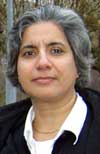 Prof. Rajni Hatti Kaul from the Dept. of Biotechnology, Lund University, receives the 2010 SKR (Association of Swedish Chemical Engineers) Award. She gets the award because of her outstanding research on sustainable
technology through GREENCHEM. This is a major research program, funded by MISTRA (Stiftelsen
för Miljöstrategisk Forskning) aimed at using modern biotechnology for
production of biodegradable chemicals from renewable resources. The award will be distributed at a ceremony in Stockholm on 5 February 2010. More information (only in Swedish).
Prof. Rajni Hatti Kaul from the Dept. of Biotechnology, Lund University, receives the 2010 SKR (Association of Swedish Chemical Engineers) Award. She gets the award because of her outstanding research on sustainable
technology through GREENCHEM. This is a major research program, funded by MISTRA (Stiftelsen
för Miljöstrategisk Forskning) aimed at using modern biotechnology for
production of biodegradable chemicals from renewable resources. The award will be distributed at a ceremony in Stockholm on 5 February 2010. More information (only in Swedish).
• Distinguished Foreign Scientist (DFS) award to Hanumantha Rao
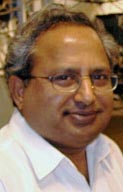 In December 2009, the Indian Council of Scientific and Industrial Research (CSIR) awarded Prof. Hanumantha Rao (photo), Division of Mineral Processing, Department of Chemical Engineering and Geosciences, Luleå University of Technology, Sweden, the title Distinguished Foreign Scientist (DFS). Prof. Rao received his award letter while visiting the Institute of Minerals and Materials Technology (IMMT) in Bhubaneshwar where he presented a course on Colloids & Interface Science to post-graduate students of a new Research Training Programme on Materials Resource Engineering initiated by CSIR. The students at this two-year programme are being paid Rs 25 000 per month during their studies, and 15 students have been chosen among 17 000 applicants. They are trained according to the needs of CSIR laboratories. Several such educational programmes have been initiated by different CSIR laboratories in the subject areas of respective laboratory interests.
In December 2009, the Indian Council of Scientific and Industrial Research (CSIR) awarded Prof. Hanumantha Rao (photo), Division of Mineral Processing, Department of Chemical Engineering and Geosciences, Luleå University of Technology, Sweden, the title Distinguished Foreign Scientist (DFS). Prof. Rao received his award letter while visiting the Institute of Minerals and Materials Technology (IMMT) in Bhubaneshwar where he presented a course on Colloids & Interface Science to post-graduate students of a new Research Training Programme on Materials Resource Engineering initiated by CSIR. The students at this two-year programme are being paid Rs 25 000 per month during their studies, and 15 students have been chosen among 17 000 applicants. They are trained according to the needs of CSIR laboratories. Several such educational programmes have been initiated by different CSIR laboratories in the subject areas of respective laboratory interests.
• Roskilde University announces PhD scholarships in Society and Globalisation
 The PhD-school in Society and Globalisation at Roskilde University in Denmark announces three PhD scholarships for employment from the 1st of April 2010 or soon after. The applications should address one or more of the following three research themes:
The PhD-school in Society and Globalisation at Roskilde University in Denmark announces three PhD scholarships for employment from the 1st of April 2010 or soon after. The applications should address one or more of the following three research themes:
1. Collaborative innovation in the public sector: New welfare – new forms of governance.
2. The challenge of globalisation in Western Europe.
3. The changing relations between the Global North and the South.
While scholarship 1 and 2 will be enrolled in the PhD program ‘Governance, Welfare and Citizenship’, scholarship 3 will be enrolled in the PhD program ’International Development Studies’. Information on the Graduate School.
Deadline for applications is 1 March 2010. More information.
• First issue of South Asian History and Culture
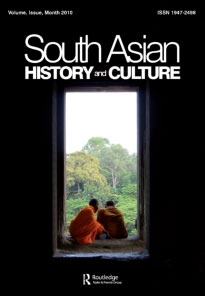 South Asian History and Culture is a new peer-reviewed South Asian studies journal, launched by Routledge. The first issue was published in January 2010, and being the first issue, it is provided online free access (go to www.tandf.co.uk/journals/rsac). The academic editors are
David Washbrook, University of Cambridge, UK;
Boria Majumdar, University of Central Lancashire, UK;
Sharmistha Gooptu, South Asia Research Foundation, India; and
Nalin Mehta, The Global Fund to Fight AIDS, TB and Malaria, Geneva Book. The journal aims to bring together research on South Asia in the
humanities and social sciences, and to provide scholars with a platform
covering, but not restricted to, their particular fields of interest and
specialization.
South Asian History and Culture is a new peer-reviewed South Asian studies journal, launched by Routledge. The first issue was published in January 2010, and being the first issue, it is provided online free access (go to www.tandf.co.uk/journals/rsac). The academic editors are
David Washbrook, University of Cambridge, UK;
Boria Majumdar, University of Central Lancashire, UK;
Sharmistha Gooptu, South Asia Research Foundation, India; and
Nalin Mehta, The Global Fund to Fight AIDS, TB and Malaria, Geneva Book. The journal aims to bring together research on South Asia in the
humanities and social sciences, and to provide scholars with a platform
covering, but not restricted to, their particular fields of interest and
specialization.
The idea is to try to achieve a truly multidisciplinary journal of South
Asia under the aegis of which the established disciplines (e.g. history,
politics, gender studies) and more recent fields (e.g. Indian sport
studies, sexuality studies) will enmesh with each other. A focus will also
be to make available to a broader readership new research on film, media,
photography, medicine and the environment, which have to date remained
more specialized fields of South Asian studies.
• Indian Elections 2009 in focus for third annual SAMAJ magazine
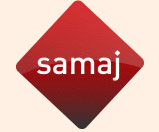 The third annual issue of South Asia Multidisciplinary Academic Journal (SAMAJ). This peer-reviewed, on-line journal, devoted to social science studies on South Asia, was launched in 2007 by the Association pour la Recherche sur l’Asie du Sud in France, with an aim to publish scholarly articles written by professional academics as well as doctoral students. Its scope is multidisciplinary, covering studies in history, geography, anthropology, sociology, political science, and economics. More information about SAMAJ on-line journal.
The third annual issue of South Asia Multidisciplinary Academic Journal (SAMAJ). This peer-reviewed, on-line journal, devoted to social science studies on South Asia, was launched in 2007 by the Association pour la Recherche sur l’Asie du Sud in France, with an aim to publish scholarly articles written by professional academics as well as doctoral students. Its scope is multidisciplinary, covering studies in history, geography, anthropology, sociology, political science, and economics. More information about SAMAJ on-line journal.
The 2009 Thematic Issue focuses on ”Contests in Context: Indian Elections 2009”, and includes the following contributions: Balveer Arora and Stephanie Tawa Lama-Rewal: Contextualizing and Interpreting the 15th Lok Sabha Elections; Christophe Jaffrelot and Gilles Verniers: India's 2009 Elections: The Resilience of Regionalism and Ethnicity; Bertrand Lefebvre and Cyril Robin: Pre-electoral Coalitions, Party System and Electoral Geography: A Decade of
General Elections in India (1999-2009); Rekha Chowdhary: Electoral Politics in the Context of Separatism and Political Divergence:
An Analysis of 2009 Parliamentary Elections in Jammu & Kashmir; and Stephanie Tawa Lama-Rewal: Studying Elections in India: Scientific and Political Debates. Go for the SAMAJ Special Issue No. 3.
• Padma Shri to Kulke and Pollock, Padma Bhushan to Tan
On 26 January 2010, the Government of India among its Republic Day
honors, awarded Padma Shri to two well-known international scholars – Hermann Kulke, Professor of South and Southeast Asian History at the Dept. of History, Kiel University, Germany; and Sheldon Pollock, regular visiting faculty to various Indian universities, and Professor of Sanskrit and Indian Studies at Columbia University, New York, USA. They were selected for Padma Shree in the Literature and Education category. More information.
At the same time, a Padma Bhushan – the third highest civilian honour by the government of
India was conferred on Prof. Tan Chung, retired Professor of
Jawaharlal Nehru University (JNU) and the University of Delhi, now living in the USA. Tan Chung is an authority on Chinese history, Sino-Indian relations and cultural exchange. Chung has been a doyen of Chinese cultural studies in India for nearly half a century.
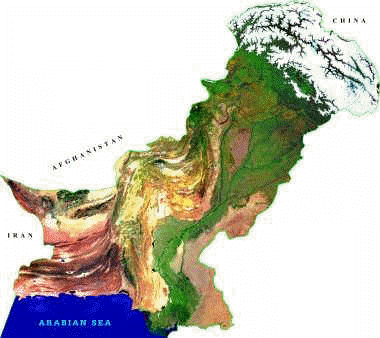
• Pakistan Security Report 2009 published by PIPS
The Pak Institute for Peace Studies (PIPS) in
Islamabad, has published its Pakistan Security Report 2009. It highlights the fact that Pakistan suffered the highest number of militancy-related casualties in 2009. An upsurge in acts of terrorism, militancy and violence further mutilated the security landscape of the country which resulted in highest number of militancy-related casualties in 2009 since the launch of War on Terror in 2001. The militants intensified their attacks, diversified their targets and expanded their areas of operation although they were killed, injured and arrested in large numbers in military and search-and-hunt operations in Swat, South Waziristan and other regions. More information.
• More information about South Asia related
research at Swedish and Nordic universities
See SASNET’s page, http://www.sasnet.lu.se/research.html
• 44 Indian deemed universities to be derecognized
The Indian Government has told the Supreme Court that it has decided to withdraw the ”deemed” status to 44 universities in the country alleging these were being run as family fiefdoms rather than on academic considerations. However, to avoid jeopardising the future of nearly two lakhs students enrolled in these universities spread over 13 states, they would be allowed to revert back as affilated colleges of their original universities, the Centre said in an affidavit. The affidavit filed by the Human Resource Development (HRD) Ministry said the government has accepted the recommendations made in this regard by the high-powered P N Tandon committee and the Special Task Force set up to suggest measures to tackle the problem.
According to the Centre, most of the 44 erring deemed universities were offering post-graduate and undergraduate courses that are "fragmented with concocted nomenclatures" and seats ”disporortionately” increased beyond the actual intake capacity. More information.
• UNESCO presents gloomy situation for education in South Asia
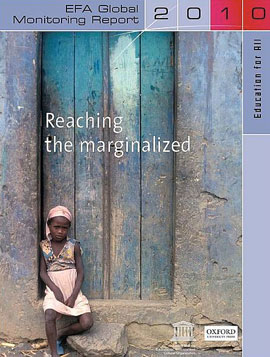 The aftershock of the global financial crisis threatens to deprive millions of children in the world’s poorest countries of an education, the 2010 Education for All Global Monitoring Report, entitled ”Reaching the marginalized”, warns. With 72 million children still out of school, a combination of slower economic growth, rising poverty and budget pressures could erode the gains of the past decade.
The aftershock of the global financial crisis threatens to deprive millions of children in the world’s poorest countries of an education, the 2010 Education for All Global Monitoring Report, entitled ”Reaching the marginalized”, warns. With 72 million children still out of school, a combination of slower economic growth, rising poverty and budget pressures could erode the gains of the past decade.
The Global Monitoring Report, developed annually by an independent team and published by UNESCO, assesses global progress towards the six Education for All goals to which over 160 countries committed themselves in 2000. The 2010 Report, Reaching the marginalized, charts some spectacular advances in education over the past decade, a striking contrast with the “lost decade” of the 1990s. Since 1999, the number of children not attending school has fallen by 33 million — and more children are completing a full cycle of primary education.
In South and West Asia, the number of children out of school has been more than halved, partly through policies aimed at getting more girls into school. In India, the number of children not in school fell by almost 15 million in just two years, from 2001 to 2003.
However, according to the report, South Asia will not reach the literacy rate set for 2015, stating that “projections indicate that the adult illiteracy rate will have fallen by 29 per cent”, rather than the intended 50 per cent reduction goal. Absolute deprivation in education remains at extraordinarily high levels throughout South Asia, despite the progress of the past decade. A new data set on education marginalization reveals that factors leading to marginalization do not operate in isolation: wealth and gender intersect with language, ethnicity, region and rural-urban differences to create mutually reinforcing disadvantages.
• In India, a child spends over seven years in school on average. Wealthy urban boys and girls average more than eleven years in school, compared with less than six for poor rural boys and just three for poor rural girls. Girls from poor households living in the state of Bihar are further disadvantaged, and receive less than 2 years of education on average.
• Policies to combat marginalization are making a difference: A stipend programme in Bangladesh is helping keep girls in school. A new law in India now legally requires states to provide free education to children aged 6 to 14.
National education finance
• The share of GNP decreased in India (from 4.5% to 3.2%). Overall, the share of public spending on education ranged from 2.4% to 3.8% in Bangladesh, India, Nepal and Pakistan, well below the developing country median (4.5%).
More information, with link to full report.
• 695 applications for Minor Field Studies (MFS) approved for 2010
Minor Field Studies (MFS) are grants for field studies, aimed at giving
Swedish students the opportunity to procure knowledge on developing countries
and development issues. This programme also aims to give students, lecturers
and institutions at universities and colleges the opportunity to establish
contact with institutions and organisations in developing countries. financed
by Sida, Swedish International Development Cooperation Agency, and administered
by the International Programme Office for Education and Training (Internationella
programkontoret). Decisions for 2010 were taken in January 2010. Grants were given to 695 applications at 107 departments/international offices at 34 universities. See the list.
• Tamil Summer School in Puducherry
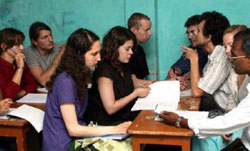 The Puducherry
(Pondicherry) Institute of Linguistics and Culture (PILC) again organises an intensive six-weeks Tamil Summer School 2010. It is organised from 12 July – 21 August 2010. The Tamil Summer School was initiated in 1998 by the Department of Social Sciences, French Institute, Puducherry to offer training to language researchers in Humanities and Social sciences. PILC has been organising this course since 2004. Read an article from The Hindu about the Tamil Summer School 2008, (with a photo by T. Singaravelou).
The Puducherry
(Pondicherry) Institute of Linguistics and Culture (PILC) again organises an intensive six-weeks Tamil Summer School 2010. It is organised from 12 July – 21 August 2010. The Tamil Summer School was initiated in 1998 by the Department of Social Sciences, French Institute, Puducherry to offer training to language researchers in Humanities and Social sciences. PILC has been organising this course since 2004. Read an article from The Hindu about the Tamil Summer School 2008, (with a photo by T. Singaravelou).
The medium of teaching is English as well as Tamil. The TSS focuses on Spoken Tamil rather than on the classical and written forms being taught in European Universities. The level of spoken Tamil course is INTERMEDIATE. More information (as a pdf-file).
• India Study Circle to be organised in Panchmarhi hill station
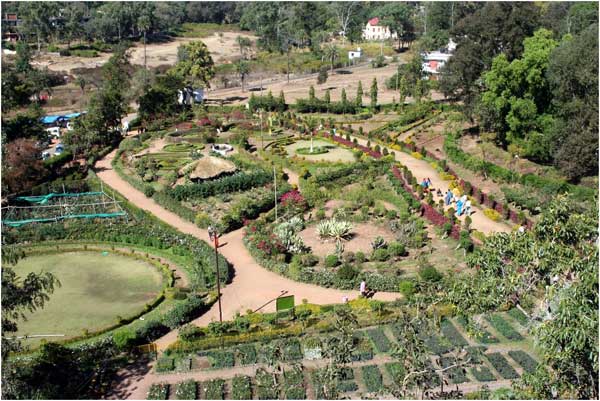 A four-week India Study Circle will be organised in Panchmarhi hill station, Madhya Pradesh, India, between 19 June and 17 July 2010. This interdisciplinary study circle brings together scholars, students
and social movement activists concerned with better understanding of the
dynamics of various regions of India. Established Indian and foreign authorities on
Central India, North India, the Deccan & South India, and the
North-east will lead the study circle. Topics covered will include, but not be limited to: adivasis;
patriarchy; caste; class; region; ecological processes; approaches to
historical-geographical writing. It is the opinion of the organisers
that the gathering will be of interest to all concerned for the
production of empirically substantiated pro-people studies. The study circle will be run as a collective. All participants will
be involved in deciding upon and performing necessary chores. More information.
A four-week India Study Circle will be organised in Panchmarhi hill station, Madhya Pradesh, India, between 19 June and 17 July 2010. This interdisciplinary study circle brings together scholars, students
and social movement activists concerned with better understanding of the
dynamics of various regions of India. Established Indian and foreign authorities on
Central India, North India, the Deccan & South India, and the
North-east will lead the study circle. Topics covered will include, but not be limited to: adivasis;
patriarchy; caste; class; region; ecological processes; approaches to
historical-geographical writing. It is the opinion of the organisers
that the gathering will be of interest to all concerned for the
production of empirically substantiated pro-people studies. The study circle will be run as a collective. All participants will
be involved in deciding upon and performing necessary chores. More information.
-
• AIIS organises Indian languages summer programmes on site in India
Every year, the American Institute of Indian Studies (AIIS) in Chicago organises summer programmes in several Indian languages on site in India. For the summer 2010 and academic year 2010-2011 AIIS offers programmes in the following languages: Hindi (in Jaipur), Bengali (in Kolkata), Punjabi (in Mohali), Tamil (in Madurai), Marathi (in Pune), Urdu (in Lucknow), Telugu (in Vizag), Malayalam (in Thiruvananthapuram), Sanskrit (in Pune), and Pali/Prakrit (in Pune). Other Indian languages are also offered upon request. These include Kannada (in Mysore), Oriya (in Bhubaneswar), Tibetan (in Dharamsala), and Kashmiri (in Delhi). The application deadline is January 31, 2010. More information.
• ODG short courses for development professionals 2010
 The Overseas Development Group (ODG), a charitable company
wholly owned by the University of East Anglia, Norwich,
UK, regularly organizes short courses for development
professionals, some of them during the Spring–Summer 2010,
on subjects like ”Climate Change and Development” (September); ”Management Information Systems for M&E” (16–27 August); ”Monitoring and Evaluating for Development Activities” (dates still to be decided); and a number of other Professional Development Programmes.
The Overseas Development Group (ODG), a charitable company
wholly owned by the University of East Anglia, Norwich,
UK, regularly organizes short courses for development
professionals, some of them during the Spring–Summer 2010,
on subjects like ”Climate Change and Development” (September); ”Management Information Systems for M&E” (16–27 August); ”Monitoring and Evaluating for Development Activities” (dates still to be decided); and a number of other Professional Development Programmes.
More information about the ODG professional courses 2010.
• Information about South Asia related
education at Swedish and Nordic universities
See SASNET’s page, http://www.sasnet.lu.se/education.html
• NSU workshop on Environmental Challenges, Politics and Food Production in South Asia
![]() The third workshop in the Nordic Summer University (NSU) project on ”South Asia in the 21st Century: Explorations in Multidisciplinary Methodology” will be held at Falsterbo, south of Malmö, Sweden, 2–3 February 2010. The Falsterbo workshop is the third out of six workshops that are being held during a period of three years within the South Asia theme. A cluster of Nordic researchers in South Asian studies prepared a proposal for these multidisciplinary NSU seminars that was accepted in 2007. The aim was to connect presently dispersed scholars on South Asian studies and upgrade the existing mass of Nordic PhD students and younger researchers in the Nordic Summer University activities. Read the full proposal for the South Asia in the 21st Century NSU programme.
The third workshop in the Nordic Summer University (NSU) project on ”South Asia in the 21st Century: Explorations in Multidisciplinary Methodology” will be held at Falsterbo, south of Malmö, Sweden, 2–3 February 2010. The Falsterbo workshop is the third out of six workshops that are being held during a period of three years within the South Asia theme. A cluster of Nordic researchers in South Asian studies prepared a proposal for these multidisciplinary NSU seminars that was accepted in 2007. The aim was to connect presently dispersed scholars on South Asian studies and upgrade the existing mass of Nordic PhD students and younger researchers in the Nordic Summer University activities. Read the full proposal for the South Asia in the 21st Century NSU programme.
The topic for the Falsterbo workshop will be ”Environmental Challenges, Politics and Food Production in South Asia”.
It focuses on looking into the question of food production under changing conditions in South Asia. Those conditions are presently characterized by uncertainty, since we do not have models for future climate change on the local level as yet, and since we do not know what will be the position of South Asian countries in the coming WTO negotiations of world food trade liberalization. One of the goals of the workshop is to analyze strategies for research into the politics of food production. To this end the organizers of the workshop will invite participation not only from rural sociologists/anthropologists and human geographers, but also scholars working on state and national politics as well as political capacity in South Asia. The organizing committeee for the Falsterbo workshop consists of Prof. Pamela Price, University of Oslo, Dr. Pernille Gooch, Lund University, and Prof. Tor Aase, University of Bergen. More information.
• Kolkata workshop on Histories of Education
1700–2000
An International Workshop on ‘Learning in the Past,
Research Agendas for the Future: Connecting Histories of Education
1700–2000,’ will be held in Kolkata, India, 3–5 February 2010. The workshop will be jointly organized by the
International Standing Conference for the History of Education (ISCHE)
and the
Institute of Development Studies Kolkata (IDSK). The focus rests on the period from
the eighteenth century onwards, and the workshop proposes to bring
together Asian historians of education and those from other
continents. Scholars are invited to present their current research in
history of education focusing on connections and relationships between
Asia and other parts of the world, colonial pedagogy, indigenous
education, migration and education, nationalism, and educational
media. The conference proposes to build up a conversation between
scholars from all over the world. More information. ![]()
• Lund University conference on legal empowerment of the poor
 The Lund University Initiative on Legal Empowerment of the Poor (LEP) hosts a conference on legal empowerment of the Poor, on 3–4 March 2010. The conference is organized in collaboration with the Academic Network on Legal Empowerment of the Poor (ANLEP) at the Centre for Development and the Environment, University of Oslo.
The Lund University Initiative on Legal Empowerment of the Poor (LEP) hosts a conference on legal empowerment of the Poor, on 3–4 March 2010. The conference is organized in collaboration with the Academic Network on Legal Empowerment of the Poor (ANLEP) at the Centre for Development and the Environment, University of Oslo.
Created in December 2008, the Lund University Initiative on Legal Empowerment of the Poor is a strategic initiative for cross-faculty collaboration, with an aim to contribute to the establishment of a solid and broad foundation for research on the issue of legal empowerment of the poor. LEP involves researchers from Lund University’s Centre for Sustainability Studies (LUCSUS); Division for Sociology of Law; Dept. of Sociology; Dept. of Business Law; Dept. of Philosophy; and Division of Social Medicine and Global Health.
In June, 2008 the International Commission on the Legal Empowerment of the Poor (CLEP), an initiative by UNDP, issued its final report entitled ”Making the Law Work for Everyone”. The Commission developed a comprehensive framework for legal empowerment, focusing on indigenous peoples, women and vulnerable groups, with four mutually reinforcing pillars: access to justice and the rule of law, property rights, labour rights and business rights. The Lund initiative also seeks to expand the scope of legal empowerment and will therefore advocate an inter-disciplinary approach to Human rights. This is chiefly done by integrating two additional dimensions into the pillars: the relationship between the national and the international; and the relationship between society and the environment.
Everyone interested in the field of Legal Empowerment of the Poor are invited to take part in the conference. Considering the limited time of the conference and given the second objective there is however no room for “new” oral presentations, but researchers and organizations are invited to give poster presentations.
Registration is optional but in order to keep track of the number of participants we recommend that your send an e-mail with your name and department affiliation to
the LEP Coordinator, Dr. Anna-Karin Bergman, before 25 February 2010. More information.
• Kolkata workshop on India the Magical. India the Eternal
The Society for Indian Culture in Kolkata organises a conference-cum-workshop entitled ”India the Magical. India the Eternal” on 15–17 March 2010. The conference papers will be divided into the following
categories: –
Classical Indian history; –
Classical Indian art & architecture; –
Indian Religion & Philosophy; and – Exchange between India & other contemporary civilization. Deadline of submission of abstracts is 5 February 2010.
• Lund University conference on Sikhs in Europe
A conference on ”Sikhs in Europe. Migration, Identity and Translocal Practices, will be held at Lund University, 16–18 June 2010. It will be organised by the Centre for Theology and Religious Studies (CTR) at Lund University, convened by Dr. Kristina Myrvold. The aim is to gather leading scholars in the multidisciplinary
field of Sikh studies and discuss current research projects focusing on
patterns of migration, identity formations, self-representations, transmission of
traditions and translocal practices among Sikhs in different parts of Europe. While
two conference days are dedicated to presentation and peer-review of papers by the
members of the academic network Sikhs-in-Europe, the third conference day will be a
workshop for Ph.D. students affiliated to European universities. The conference is
public and open to students and researchers in all disciplines. More information.
• Copenhagen conference on Processes of Subjectivation
A Ph.D. course and conference entitled ”Processes of Subjectivation: Colonial and Postcolonial Perspectives” will be held in Copenhagen, Denmark 16-18 August 2010. It sets out to investigate thenexus between processes of subjectivation and various forms of colonial and postcolonial governance. Subjectivation refers to
processes whereby new moral subjects are coming into being via practices of the self. The joint Ph.D. course and conference will consist of four sessions with presentations from leading experts in the field and separate sessions with Ph.D. presentations. The sessions
focus on – Colonial Governmentality: Security, Territory, Population; – Colonial Childrearing; – Technologies and Subjectivation; and – Biological Determinism and Subjectivation. Invited speakers include Prof. David Arnold, Dept. of History, and Dr. Gurminder K Bhambra, Dept. of Sociology, both at the University of Warwick in UK; Dr. Niels Brimnes, Dept. of History and Area Studies, Aarhus University; Prof. Gyan Prakash, Princeton University, USA; and Dr. Satadru Sen, Queens College, USA. Applications must be sent 1 March 2010. More information.
• Major Copenhagen conference on Asian Diversity in a Global Context
 The Asian Dynamics Initiative (ADI) at the University of Copenhagen invites to an international three-day conference entitled ”Asian Diversity in a Global Context” 11–13 November 2010, followed by a two-day PhD course for graduate students, 14-15 November 2010. The opening day of the conference is allocated to a big public event with invited keynote speakers. The following two days will be made up of 10-12 parallel panels and workshops under the common theme ”Asian
Diversity in a Global Context”. The goal is to generate deeper and fuller insights into the political, social, cultural and economic changes facing Asia in the 21st century. Finally, PhD students will have the opportunity to participate in an intensive PhD course over two days (more information). The conference welcomes papers relating to one of the themes of the conference panels and workshops. Deadline for submission of abstracts is 1 March 2010 Some of the panels are specifically related to South Asia:
The Asian Dynamics Initiative (ADI) at the University of Copenhagen invites to an international three-day conference entitled ”Asian Diversity in a Global Context” 11–13 November 2010, followed by a two-day PhD course for graduate students, 14-15 November 2010. The opening day of the conference is allocated to a big public event with invited keynote speakers. The following two days will be made up of 10-12 parallel panels and workshops under the common theme ”Asian
Diversity in a Global Context”. The goal is to generate deeper and fuller insights into the political, social, cultural and economic changes facing Asia in the 21st century. Finally, PhD students will have the opportunity to participate in an intensive PhD course over two days (more information). The conference welcomes papers relating to one of the themes of the conference panels and workshops. Deadline for submission of abstracts is 1 March 2010 Some of the panels are specifically related to South Asia:
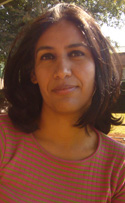 – Governing Difference: Explorations in Identity and Equality in the Global South, convened by Dr. Ravinder Kaur (photo to the right).
– Governing Difference: Explorations in Identity and Equality in the Global South, convened by Dr. Ravinder Kaur (photo to the right).
– The Transmission of Sanskrit Medical Literature in India, convened by Dr. Kenneth Zysk
– Indigenous people in the 21st Century Asia: Identities and Stategies for self-determination, convened by Dr. Peter B. Andersen
'Asian Diversity in a Global Context' is the third in the series of annual conferences initiated by ADI and the University of Copenhagen in 2008. ADI aims at expanding research and teaching on Asia as well as strengthening the university's global networks in studies of Asia.
More information about the Asian Diversity in a Global Context conference.
•
ECO-TECH’10 again to be held in Kalmar
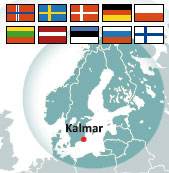 The Seventh International Conference on the Establishment of Cooperation Between Companies and Institutions in the Nordic Countries, the Baltic Sea Region, and the World, Linnaeus ECO-TECH’10, will be held 22–24 November 2010 in Kalmar. It is a conference on Natural Sciences and Environmental Technologies for Waste and Wastewater Treatment, Remediation, Emissions Related to Climate, Environmental and Economic Effects.
The Seventh International Conference on the Establishment of Cooperation Between Companies and Institutions in the Nordic Countries, the Baltic Sea Region, and the World, Linnaeus ECO-TECH’10, will be held 22–24 November 2010 in Kalmar. It is a conference on Natural Sciences and Environmental Technologies for Waste and Wastewater Treatment, Remediation, Emissions Related to Climate, Environmental and Economic Effects.
The conference is organised by the Linnaeus University, a fusion betwen the University of Kalmar and Växjö University from 1 January 2010. Linnaeus University will make use of the strengths of its two centres of learning and is the result of a desire to increase quality, attractiveness and developmental potential for teaching and research. The organising committee includes Prof. William Hogland, Division of Environmental Engineering in Kalmar. He has been involved in research focusing on waste treatment in Nepal, and has also been responsible for organising the Kalmar Eco-tech conferences since they were introduced in 1997. Prof. Kurian Joseph from Anna University, Chennai, India, is part of the scientific committee behind the ECO-TECH’10 conference. Deadline for sending abstracts is 1 March 2010. More information.
• Other conferences connected to South Asian
studies arranged all over the World
See SASNET’s page, http://www.sasnet.lu.se/conferences.html#conf
Important lectures and seminars in Scandinavia
• Julius Lipner and Graham Schweig lecture at Gothenburg University
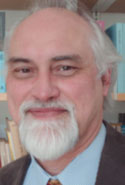 The Dept. of Literature, History of Ideas, and Religion at University of Gothenburg organises two lectures in religious studies open to the public on Friday 5 February 2010. Venue: Humanisten, Lilla hörsalen, Renströmsgatan 6, Gothenburg.
The Dept. of Literature, History of Ideas, and Religion at University of Gothenburg organises two lectures in religious studies open to the public on Friday 5 February 2010. Venue: Humanisten, Lilla hörsalen, Renströmsgatan 6, Gothenburg.
15.15–16.30: Julius Lipner (photo), Professor in Hinduism och Comparative Religion at the Divinity Faculty, University of Cambridge, UK, lectures on ”The Nature of Hinduism: A Unique Approach”.
16.45–18.00: Graham Schweig,
Director for the program of Indic studies at Christopher Newport University, and guest lecturer in Sanskrit at the University of Virginia, USA, lectures on ”The Circular Geography of Inner Consciousness: Corroborative Patterns in Hindu Pilgrimage, Yoga Meditation, and Sacred Narrative”.
More information.
• CPAS lecture with Bo Kage Carlsson
The Swedish journalist Bo Kage Carlsson holds an open lecture on ”Indisk politik: Rättning mitten men oro i periferin” (Indian politics: correction in the middle, but unrest in the periphery) at Stockholm University on Wednesday 10 February 2010, 15.00–17.00. The seminar is one of the regular Wednesday lectures arranged by the Centre for Pacific Asian Studies (CPAS), at Stockholm University. Venue for the lecture: Room 136, Dept. for Oriental Languages, Kräftriket 4 A (earlier Roslagsvägen 101), Stockholm.
• Swallows seminar in Lund with four volunteers
The Swallows India Bangladesh section in Lund organises an open seminar with four of its volunteers who have been stationed in South Asia during the fall 2010, on Wednesday 10 February 2010, 18.30 – 20.30. Karin Valtersson is a political scientist who has studied the consequences of climate change in Bangladesh, and how it affects ordinary people’s lives in the countryside. Kjell Vowles, a journalist, has studied the caste system and the situation for Dalits in southern India. Kristoffer Eriksson, a gender studies scholar, has been to southern part of Bangladesh and studied the situation for women in the region. Finally, Sandra Thunander, a biologist, has interviewed poor peasants in south India on possibilities to go in for ecological farming. Venue: Svalorna Indien Bangladesh, Spolegatan 5. For more information, please contact Mr. Tobias Petersson.
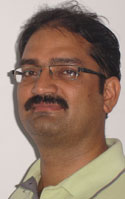
• Vipin Negi lectures on the Implementation of NREGS
Dr. Vipin Negi, Assistant professor of Economics in Keshav College at the University of Delhi, India, will hold an open lecture at Lund University on ”The Implementation of NREGS (National Rural Employment Guarantee Scheme) in India – Some Ground Realities” on Thursday 18 February 2010, 12.15 – 13.15. Dr. Negis is currently a post-doctoral fellow, funded by an Erasmus Mundus External Cooperation Window programme, at the Centre for East and South-East Asan Studies (ACE), Lund University. More information about Dr. Negi.
• Copenhagen guest lecture by Erica Bornstein
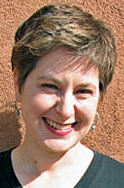 Erica Bornstein, Assistant Professor in Anthropology at the University of Wisconsin, Milwaukee, USA, will hold an open guest lecture on ”Philanthropy and Empathy in New Delhi” at the
Department of Cross-Cultural and Regional Studies (TORS), University of Copenhagen, on
Tuesday 16 March 2010, 14.00–16.00. Dr. Bornstein has done extensive research in the areas of philanthropy, charity and humanitarianism, development, human rights, NGOs, political anthropology, and religion, and she has fieldwork experience from southern Africa and India. Bornstein is the author of ‘The Spirit of Development. Protestant NGOs, Morality and Economics in Zimbabwe.’ (Stanford University Press, 2005), and ‘Disquieting Gifts: An Ethnography of Humanitarianism in New Delhi.’ (Stanford University Press, forthcoming). Venue: TORS, Room U3 (1st floor), Snorresgade 17-19, Copenhagen. More information.
Erica Bornstein, Assistant Professor in Anthropology at the University of Wisconsin, Milwaukee, USA, will hold an open guest lecture on ”Philanthropy and Empathy in New Delhi” at the
Department of Cross-Cultural and Regional Studies (TORS), University of Copenhagen, on
Tuesday 16 March 2010, 14.00–16.00. Dr. Bornstein has done extensive research in the areas of philanthropy, charity and humanitarianism, development, human rights, NGOs, political anthropology, and religion, and she has fieldwork experience from southern Africa and India. Bornstein is the author of ‘The Spirit of Development. Protestant NGOs, Morality and Economics in Zimbabwe.’ (Stanford University Press, 2005), and ‘Disquieting Gifts: An Ethnography of Humanitarianism in New Delhi.’ (Stanford University Press, forthcoming). Venue: TORS, Room U3 (1st floor), Snorresgade 17-19, Copenhagen. More information.
Business and Politics
• Information about South Asia related business and politics in Sweden
See SASNET's page, http://www.sasnet.lu.se/polbuss.html
South Asia related culture in Scandinavia
•
Indian films at the 2010 Göteborg International Film Festival
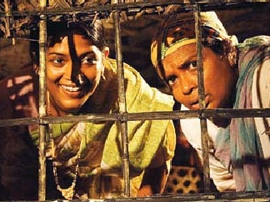 The 33rd Göteborg International Film Festival, starting on Friday 29 January 2010 (and lasting tilll Monday 8 February), will show at least six movies connected to India. They are gathered under the subtitle ”Beyond Bollywood” and feature films from the states of Jammu & Kashmir, Karnataka and Maharashtra. They include Girish Kasaravalli’s new film ”Gulabi Talkies” (photo); Tariq Tapa’s ”Zero Bridge”, and Sachin Kundalkar’s ”The Smell”.
The 33rd Göteborg International Film Festival, starting on Friday 29 January 2010 (and lasting tilll Monday 8 February), will show at least six movies connected to India. They are gathered under the subtitle ”Beyond Bollywood” and feature films from the states of Jammu & Kashmir, Karnataka and Maharashtra. They include Girish Kasaravalli’s new film ”Gulabi Talkies” (photo); Tariq Tapa’s ”Zero Bridge”, and Sachin Kundalkar’s ”The Smell”.
Since ten years the Göteborg International Film Festival also works in cooperation with the Swedish International Development Cooperation Agency, Sida, with a fund that supports film makers living and working in development countries. For the 2010 festival, the board of the fund has selected nine out of 70 projects for post production support. Two of them are Indian: –
The Mirror, by Nilanjan Bhattacharya; and – Quarter Number 4/11, by Ranu Ghosh. More information on the 2010 Göteborg International Film Festival.
• More information about South Asia related culture
in Sweden and Scandinavia
See SASNET’s page, http://www.sasnet.lu.se/culture.html
New and updated items on SASNET web site
• Swedish departments where research on
South Asia is going on:
Constantly added to the list of research environments at Swedish
universities, presented by SASNET. The full list now includes 263 departments,
with detailed descriptions of the South Asia related research and education
taking place! Go to http://www.sasnet.lu.se/environment.html
‡ Medical Microbiology, Division of Laboratory 1, Department of Clinical and Experimental Medicine (IKE), Faculty of Health Sciences, Linköping University.
‡ Traffic and Roads, Department of Technology and Society, Lund University
• Useful travelling information
Look at http://www.sasnet.lu.se/travelling.html.
Updated travel advises from the The British Foreign & Commonwealth
Office about safety aspects on travelling to the countries of
South Asia.
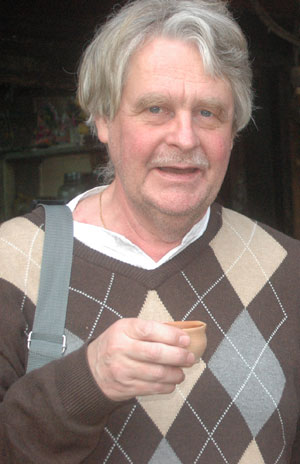 |
| SASNET webmaster on relaxing January 2010 holiday in Kolkata, India. |
Best regards,
Lars Eklund
deputy director/webmaster
SASNET/Swedish South Asian Studies Network
SASNET is a national network for research, education, and information about South Asia based at Lund University. Its aim is to promote a dynamic networking process in which Swedish researchers co-operate with researchers in South Asia and globally.
The SASNET network is open to all the sciences. Priority is given to interdisciplinary cooperation across faculties, and more particularly to institutions in the Nordic countries and South Asia. SASNET believes that South Asian studies will be most fruitfully pursued as a cooperative endeavour between researchers in different institutions who have a solid base in their mother disciplines.
The network is financed by Lund
University.
Postal address: SASNET – Swedish South Asian Studies Network,
Scheelevägen 15 D, SE-223 70 Lund, Sweden
Visiting address: Ideon Research Park, House Alpha 1 (first floor,
room no. 2040), in the premises of the Centre for East and South
East Asian Studies at Lund University (ACE).
Phone: + 46 46 222 73 40
Fax: + 46 46 222 30 41
E-mail: sasnet@sasnet.lu.se
Web site:
http://www.sasnet.lu.se
SASNET - Swedish South Asian Studies Network/Lund
University
Address: Scheelevägen 15 D, SE-223 70 Lund, Sweden
Phone: +46 46 222 73 40
Webmaster: Lars Eklund
Last updated
2011-04-08